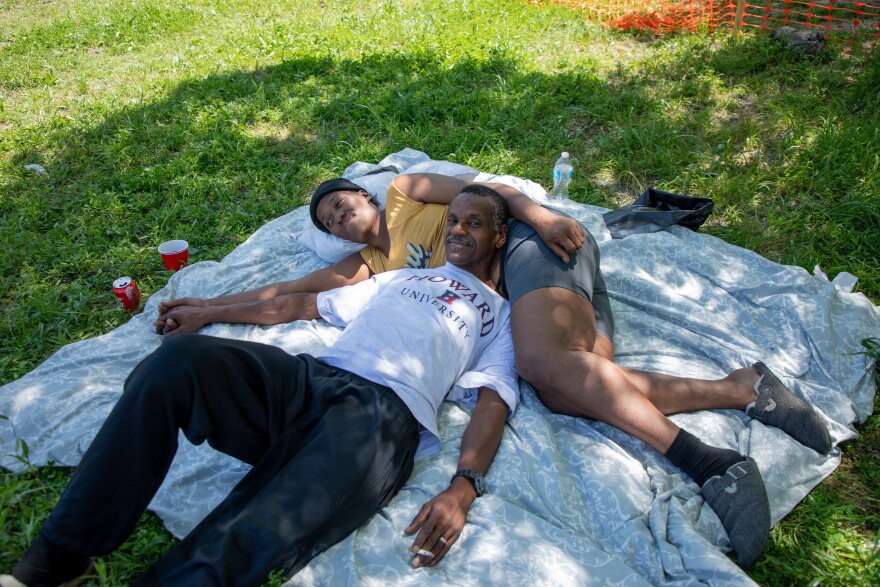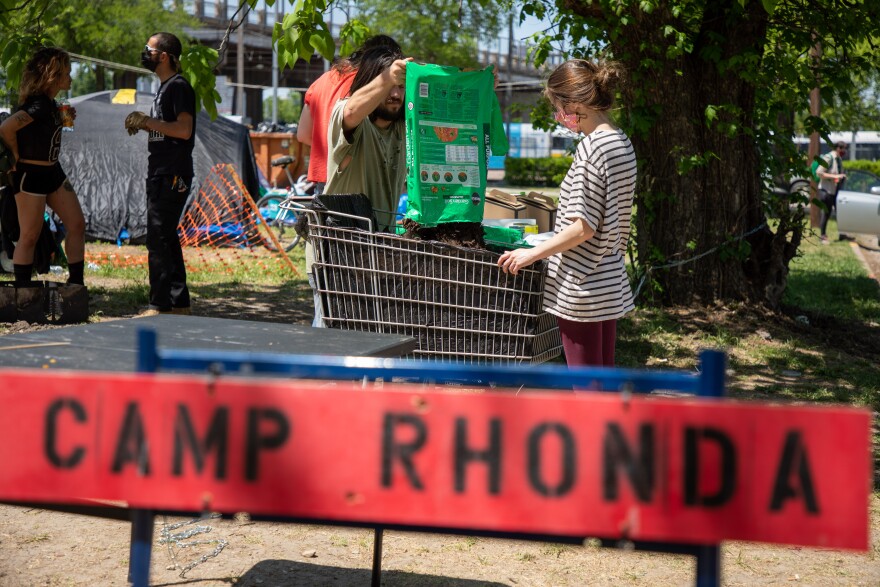The scorching Texas sun beat down on volunteers over the weekend as they wielded hammers, wooden planks and large bags of mulch. They were building raised planters that would become a community garden for Camp Rhonda.
The homeless encampment was originally founded in October of last year by some unsheltered Dallas residents with the help of a few nonprofit groups like Dallas Stops Evictions and Feed the People Dallas.

Though the location has changed multiple times over the last few months because of zoning issues and pressure from the city, the encampment was created as a centralized location where mutual aid groups can provide resources and assistance to some of Dallas’ unsheltered population.
James Magruder is with the Dallas chapter of Food Not Bombs, a national organization that aims to make fresh, healthy food more accessible to all. His group was leading the charge in getting the garden set up.
“It's just about having food growing where people need it, there's a lot of food deserts in Dallas where people can't get fresh food,” Magruder said. “We want to change the city so there's fruit trees on the street and you can just grab a pomegranate or an apple or a fig, and it's just growing out, as part of our environment.”
Not only that, but Magruder said community gardens also bring the community together and can help people learn a valuable new skill: How to grow their own food.

“We just want food security for everyone,” he said. “The city of Dallas has so much vacant space. We could put a community garden in every single one of those spaces — there'd be enough food for every houseless person in the city. It's the fact that the city doesn't do that, that's the biggest problem.”
On Sunday, volunteers worked to install three raised planters and modify two shopping carts as portable herb gardens. The raised beds will feature a number of different fruits and vegetables — some that can be eaten raw and others that will be cooked over a fire.
“One bed is going to be the three sisters, which is a native American way of planting,” Magruder said. “So it's going to be beans, squash and corn together, and they all help each other out in the growing process.”
He said another planter will grow a mixed bag of different vegetables like cucumbers and tomatoes, while the third and final planter will grow sunflowers.
“I understand they want to do good, but we’re the ones out here. We're the ones that take the risk of doing anything.”Robert Bates, Camp Rhonda resident
While volunteers worked to build the garden beds and plant the seedlings in the soil, residents of Camp Rhonda watched from a distance — some with excitement and others with trepidation.
Demetria LeBranch and Sam Cade lounged in the shade of a nearby tree, watching volunteers build the garden. They both said they’re eager to eat the produce once the vegetables are ready, and said it will be a good thing for the camp.

Sherlene Griffith was also excited, but for a different reason.
“I get to dig in the dirt!,” Griffith exclaimed. “I love the dirt and I get to plant plants.”
Griffith said before she lost her home, she was a horticulturist in Florida for 20 years, planting and taking care of trees specifically. She said she was excited to be able to do that again.
But not everyone feels the same way. Some of Camp Rhonda’s residents, like Robert Bates, are wary of the unwanted attention the garden may draw.
"We're tired of moving and we seem to be settled here,” Bates said. “Code Compliance is working with us, the community's working with us and it's great, but I don't want to upset what's going on right now."

Bates says the organizers who built the garden didn’t listen to the concerns of some of Camp Rhonda’s residents.
“It's strictly their ideas, their placement, their plan,” he said. “I understand they want to do good, but we’re the ones out here. We're the ones that take the risk of doing anything.”
Daniel Gardner, an unaffiliated volunteer, agreed. He said organizations should not come to Camp Rhonda and make executive decisions.
“If people have a project idea, they want to come to Camp Rhonda, I think they should have a meeting,” Gardner said. “So all of the residents can either voice their concerns or can learn more about the project. That way they can be involved.”
“Folks might come here all the time, but [they] don't live here and don't have to live with the ever daunting concern of being evicted from this place,” he said.
Ryan Ahmadian with Dallas Stops Evictions has been volunteering with Camp Rhonda since its inception. He said the encampment has gotten permission from the city to stay at its current location for now without being displaced.
“Folks might come here all the time, but [they] don't live here and don't have to live with the ever daunting concern of being evicted from this place.”Daniel Gardner, volunteer
That's partly because of a Centers for Disease Control and Prevention (CDC) moratorium against sweeping encampments during the pandemic.
But with pandemic restrictions easing and an end in sight, Ahmadian says he’s not sure what the future holds for Camp Rhonda. He wants the city to designate certain areas as legal encampment zones.
“That way they kind of have immunity from the city messing with [the encampments] and shutting them down,” Ahmadian said. “Kind of allowing for a place where people have access to resources, in a more grassroots sense, with no barriers to entry. We're not gate keeping any of the resources and services that we provide, even for people that aren't in the camp.”
Ahmadian said he’s talking with city officials about setting up a meeting with all the entities that would need to be involved in the process of creating legal encampment zones.
Got a tip? Email Rebekah Morr at rmorr@kera.org. You can follow her on Twitter @bekah_morr.
KERA News is made possible through the generosity of our members. If you find this reporting valuable, consider making a tax-deductible gift today. Thank you.










